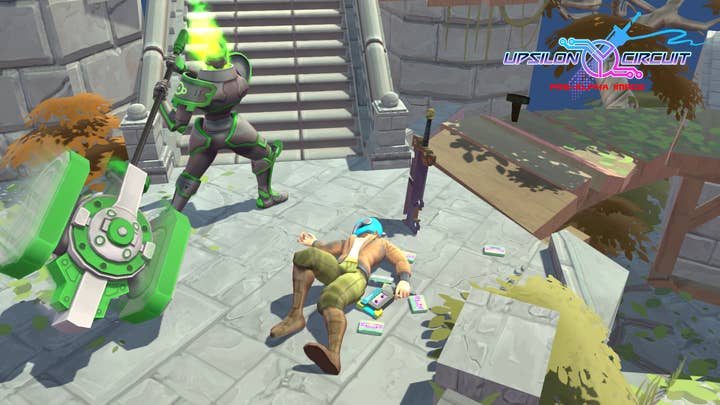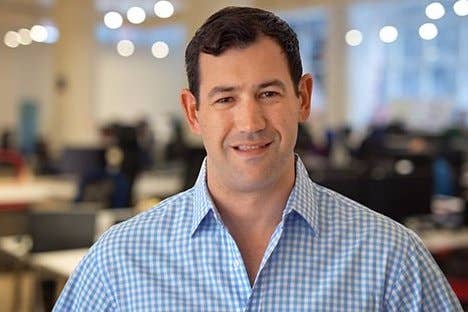"The scale required, even for indie success, has changed"
Execution Labs' Keith Katz on why the Montreal incubator has evolved
When you're running an incubator or accelerator, you don't just have to keep up with the game, you have to stay ahead of it: teach your teams an outdated lesson and you're not just failing them, you're actively setting them back. Things move quickly.
Montreal's Execution Labs has run the gamut of models, from extended, tightly curated incubation through to the 'finishing fund' model which the outfit adopted in March. Today, XL has announced its newest partnership, which it believes is the first in an entirely new genre: the video game show.
Upsilon Circuit comes from New Hampshire-based husband and wife team Robot Loves Kitty and will focus on a relatively conventional competitive set-up of eight online players taking on a dungeon of traps and monsters to earn points and glory. However, those eight players aren't the focus. Instead, it's the audience who'll be making most of the decisions as they watch events unfold on streaming services like Twitch, a model described by its creators as "The Price is Right meets The Hunger Games."
"They collectively pick contestants' skills, drop in helpful items, and generally have the ability to save or destroy the competitors," the Upsilon Circuit press release explains. "Skilled players may be able to survive for weeks or even months, but once they're dead, they're dead for good. Audience members will then step in to take their place."
For Execution Labs, it's another example of just how ahead of the curve you have to be looking in order to remain relevant. Catching up with co-founder Keith Katz at this year's GDC, he explained some of the pressures behind the constant evolution.

Can you explain the basics of the reasoning behind the latest shift in your funding model? What's it been in response to?
"We look at it as an evolution of the model, based on what we were doing already. We were doing accelerator/incubator activities, doing nine or ten month engagements, then we moved onto three month pure accelerator, in and out cohort-based, then last year we started our finishing fund, looking at coming in on later stage studios and deploying our resources remotely, to see if that was effective.
"A couple of other things are relevant. We had 20 or so existing portfolio studios. We had always said that we want to be super hands-on investors, and you really start to question whether you can do that when we have another five studios coming in, then another batch...We just couldn't service them in the way we wanted to. But the biggest thing is that the industry has changed since we started. I'm not sure how effective it is to give studios a $50,000 cheque these days. The scale required, even for indie success, has changed. We had to start asking ourselves if we were doing a disservice by saying to studios, 'hey we'll give you $50K and a lot of coaching and you'll be fine.'
"the biggest thing is that the industry has changed since we started. I'm not sure how effective it is to give studios a $50,000 cheque these days"
"With a combination of luck and expertise, we were able to make sure that the last several batches which came through all jumped the gap between our funding and their next source, be that publisher, Kickstarter or investor. So they all did OK and many of them are thriving, but we weren't sure how long that would continue."
You're making bigger investments, with more risk. Does that mean tougher criteria?
"I think so. We're looking at a couple of things as key drivers. Some of the stuff will be the same as it always has: what's the management team like, are they just game devs or devs and entrepreneurs? We're equity investors, so they have to have the desire to grow the business to a certain level, it's not just about paying for rent and dinner. So we now have slightly higher expectations of what that standard is.
"We're also looking for people who are leading on social and multiplayer experiences. That doesn't mean we won't invest in someone doing a really cool single player experience, but unless you're AAA, the scale you can achieve at the funding levels we're providing isn't that interesting unless there's social and multiplayer, which helps so much with marketing. That's another huge thing we look at, how the team is handling distribution and marketing. Social and multiplayer is a big aspect of that: using Twitch, YouTube, galvanising enthusiasts.
"If this is a project that's raising $1.5 million at seed level, then eventually they're going to raise a lot more, so it's going to have to scale really decently for any of the early investors to see any return"
"Even though we're saying we'll invest up to $500,000, it doesn't mean we'll always invest that much, or that we'll always invest alone. If you have a game that's a $2 million project, we can work with other investors. But in those cases, scale is even more important. We're coming in at seed level. We don't always have to be the first investors, but we like to be. If this is a project that's raising $1.5 million at seed level, then eventually they're going to raise a lot more, so it's going to have to scale really decently for any of the early investors to see any return.
"It's about finding studios who want to grow, to keep pushing themselves. Not everyone wants to do that, and there's nothing wrong with that. If your goal is to make cool games which make enough money to make another one, that's fine, that's admirable. But we're applying that filter - we talk about it as scaffolding - each game provides the scaffolding for the next."
Are you still platform agnostic?
"Yeah, we'll look at mobile, PC and console as long as they other boxes are checked."
Previously, you've happily integrated your involvement with other fundraising models, such as Kickstarter. Does that still work with this later-stage investment?
"We're happy to do it, but Kickstarter as a funding model is not super helpful for most developers. Let's say you're wildly successful and you raise $300,000. That's great, but...Really we use Kickstarter as more of a marketing tool. Unless you're rebooting a famous '90s retro IP or you're a well-known developer, you're not getting into millions, it's gotten a lot harder. We're also interested in what Fig is doing, in that platform, maybe there'll be something there."
There's been some backlash to Fig's model, people suggesting that perhaps seeking out investors who don't know about investment is somewhat exploitative...
"Kickstarter as a funding model is not super helpful for most developers...Unless you're rebooting a famous '90s retro IP or you're a well-known developer, you're not getting into millions"
"I don't have a dog in the fight, but, at least it's curated platform. You won't just get some schmo putting vapourware up there. Everything there so far has been a legitimate game from an established developer. If someone is super passionate about a project and wants to give them $100 or $1000, I don't see the harm. I would hope that there aren't fans putting $10K into a game, but I don't know what the break down is. There are a lot of nuances to the system, so I don't pretend to be an expert."
The stuff you're doing now, helping people access services, get funds, managing global teams, aren't you moving closer to publishing
"I don't think so. We're not doing a lot of the key publisher functions, and nor do we want to. So we're not focused on executing marketing campaigns, user acquisition, that sort of thing. We're good at things like soft launches and testing, which are sort of publisher functions for mobile games, but that's not why you sign with a publisher. So we do some of the things a publisher would, but I would argue that we're much more hands on. We're in the weeds every day. Along with that we're basically agents, too. If we're funding you and your ultimate goal is to work with a publisher, tell us which one and we'll get you in a room. That's part of our service. We don't want to compete with publishers, in fact, more and more we're collaborating with them."

